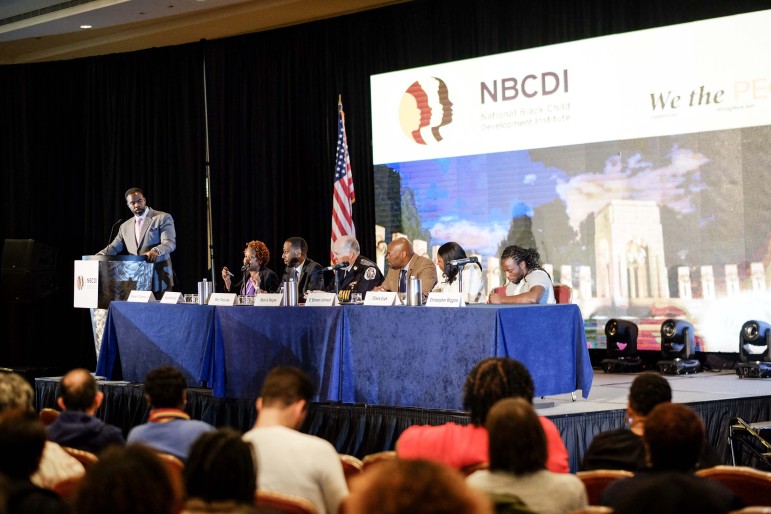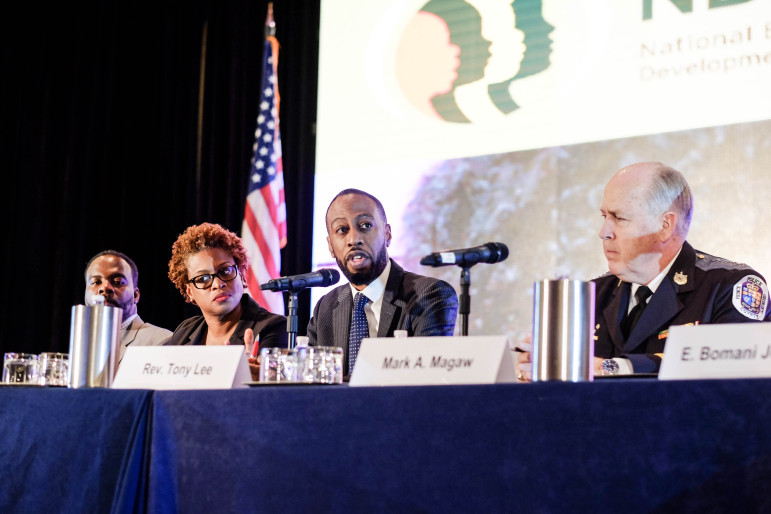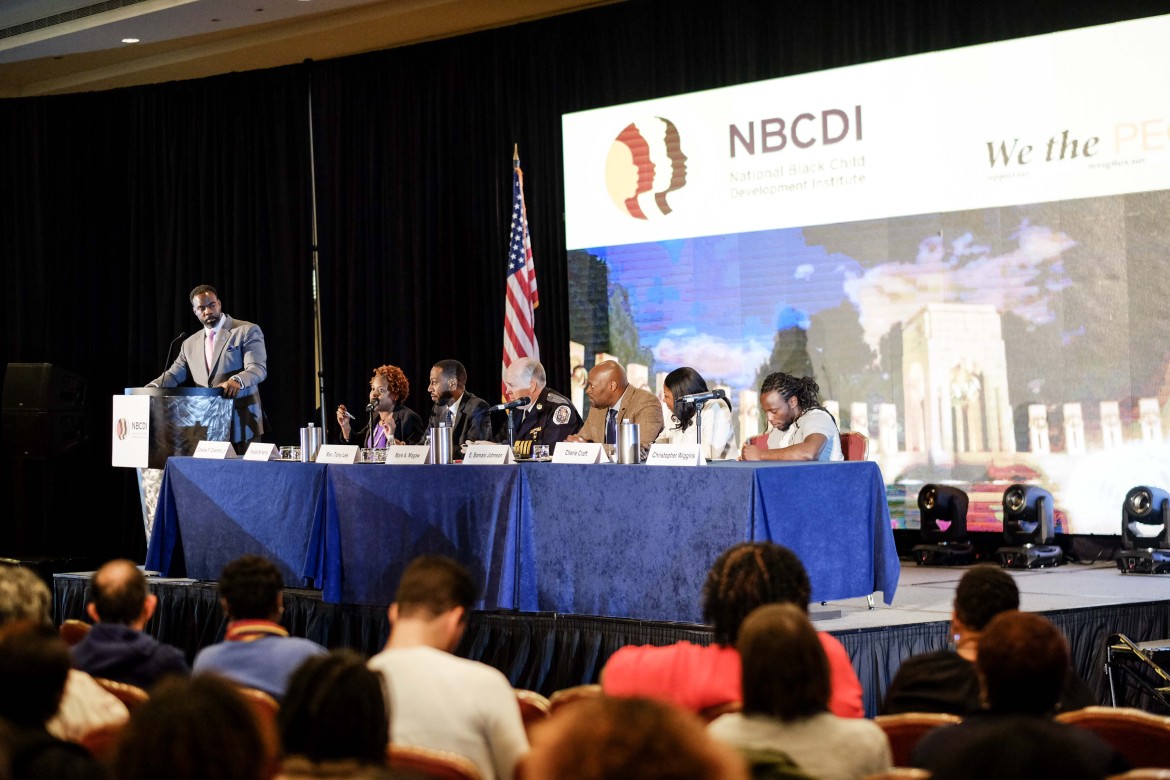
Bill Lee/NBCDI
Khalila Harris (second from left), deputy director at the White House Initiative on Educational Excellence for African Americans, speaks during a panel at the National Black Child Development Institute's annual conference in Arlington, Va.
WASHINGTON — In May 2013, Kiera Wilmot was arrested and charged with two felonies after she accidentally created a small explosion while doing a volcano science experiment at her high school in Polk County, Florida. She was later expelled.
“You raise your kids to do certain things, and I thought I did pretty well raising my kids,” said Kiera’s mother, Marie Wilmot, at a Washington press conference this week. “And so getting a phone call [saying Kiera had been arrested] threw me for a loop.”
Amid pressure from the media and advocacy groups, Kiera was eventually allowed to go back to school. But the experience followed her beyond graduation as she applied to college, when she was forced to check a box indicating she had felony charges and explain to admissions counselors what happened.
Her story is an example of how schools’ zero tolerance policies can begin to push students — especially students of color — out of the school system and into the criminal justice system, part of a process known as the school-to-prison pipeline.
— especially students of color — out of the school system and into the criminal justice system, part of a process known as the school-to-prison pipeline.
A 2013 report by the Vera Institute, a nonpartisan, nonprofit justice research center, showed that black middle school students were suspended four times as often as their white counterparts, and Latino students two times as often, due to school policies that mandate suspension or expulsion for single offenses that can range from drug possession to fighting.
“When we have 3- and 4-year-olds who are being excluded, suspended, expelled from schools, we have a problem,” said Khalilah Harris, deputy director at the White House Initiative on Educational Excellence for African Americans, during a panel discussion at the National Black Child Development Institute’s annual conference in Arlington, Va., this week. “There is nothing a 3- and 4-year-old can do that warrants us telling them, ‘You can’t come back here.’”
The NBCDI session featured a discussion of the issues swirling at the crossroads of school and the law, and offered concrete solutions to the challenges facing black youth at that intersection.
“Our young people, particularly our young men, start off, a lot of times, in schools that have given them a narrative,” said Charles F. Coleman Jr., a trial attorney in the New York District Office of the Equal Employment Opportunity Commission and the panel’s moderator. “A narrative like ‘special education.’ A narrative like ‘behaviorally challenged.’ Narratives that have set the trajectory for them for the next 20 to 30 years.”
Harris emphasized the need for schools to use school discipline data to help change those narratives and reduce disparities in disciplinary outcomes for students of color.
“If you don’t have data, it’s difficult for you to advocate from a place of knowledge as opposed to emotion,” she said.
“It is critical for us as adults to take the data that we have, dissect it, see what we’re doing,” she said. “It has to be a systemic look at your data, to take a step back and say, ‘Who do we need to train?’ … ‘How are we engaging families?’”

Bill Lee/NBCDI
Rev. Tony Lee, senior pastor of the Community of Hope African Methodist Episcopal Church in Temple Hills, Maryland, speaks during a panel at the National Black Child Development Institute's annual conference in Arlington, Va.
Deborah Green, president of NBCDI’s Houston affiliate, agreed, referencing the value of the data in the Vera Institute report.
“Let’s take a look at [the data],” she said after a workshop on the impact of zero tolerance. “Let’s take a look at it and let it drive the direction that it’s taking us in.”
The role of parents
Preparing parents to engage with schools is another way to advocate for black youth in the school system, said Cherie Craft, executive director of Smart from the Start, during that panel.
“We know you cannot educate a child in the public school system independent of their family and community,” she said.
This means teaching families the chain of command at schools so they know who they can talk to about their experiences. Craft said her group has even held mock parent-teacher conferences to prepare parents on what to expect.
Getting parents to step confidently into that role can be difficult, Craft said, because many had negative experiences in school themselves.
“The young parents that we need don’t even want to cross the threshold into the school building on the first day of school because they’re intimidated and really traumatized by what’s happened to them,” Craft said.
Marie Wilmot said the most important thing parents can do is stand up and fight for children who are caught up in school disciplinary issues.
Even though she was a PTA member and had volunteered in the schools, she said being involved might not help with how the school handles discipline.
“A lot of people at school knew me, but that didn't stop Kiera's arrest,” she said. “You just have to be there to tough it out.”
Police officers in schools
Though zero tolerance policies were intended to keep schools safe, they have instead had the effect of “scaring kids straight,” Green said.
Placing law enforcement officers in schools only exacerbates the problem, she said.
Mark Magaw, police chief of Prince George’s County Police Department in Maryland, said that while the department’s officers are in schools to keep students safe, their real goal is to build relationships with them, not discipline them.
But the presence of police officers in schools can instill fear in kids, said Coleman Jr., the moderator.
“As a young person looking at a uniformed, armed officer in a school, I don’t feel safe,” he said. “I don’t feel protected. I feel as though someone is trying to keep me in order.”
“What makes schools safe is teachers knowing students and parents knowing teachers,” Green said. Discipline, she said, needs to be put back into the hands of administrators, who have the ability to institute levels of discipline rather than the one-strike policy of zero tolerance.
“We should have some sense of judgement,” she said.
Since Kiera’s arrest, some of her school’s policies have changed, her mother said. The school has said it is not so quick to arrest students anymore, and will instead review each case individually.
Kiera now attends Florida Polytechnic University, where she is studying mechanical engineering. On Monday night, she visited the White House for Astronomy Night, where she met President Barack Obama, science educator and TV personality Bill Nye and Ahmed Mohamed, the Texas boy who was arrested in September after bringing a clock to school that authorities thought was a bomb.
Her advice for students who have found themselves caught up in the justice system?
“Don’t give up on your education,” she said during Wednesday’s press conference. “Stay focused.”
More related articles:
Foundations Pledge Nearly $200M to help Boys, Young Men of Color
After Decades of Spending, Minority Youth Still Overrepresented in System
New California Data Show Drop in Overall School Suspensions, Expulsions
